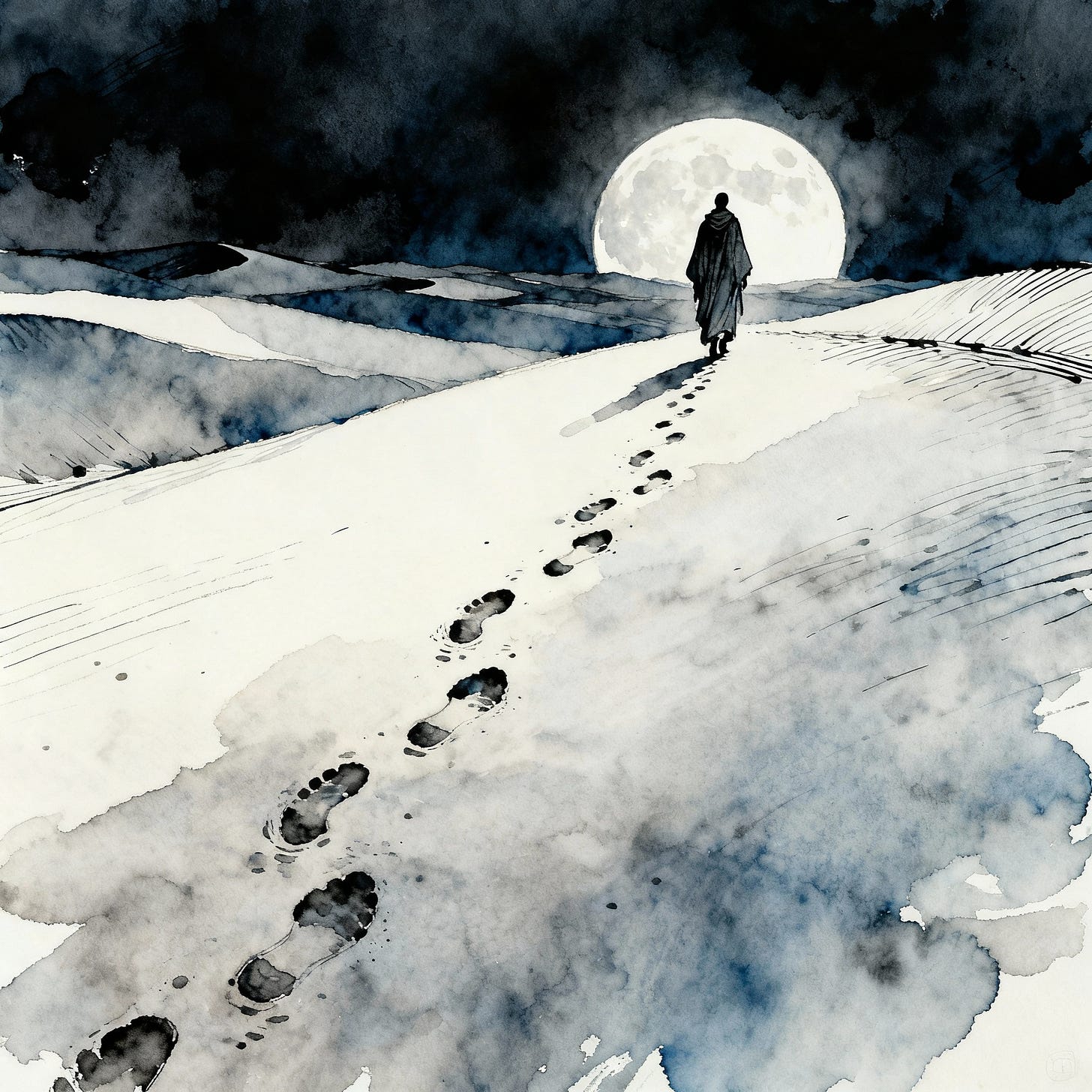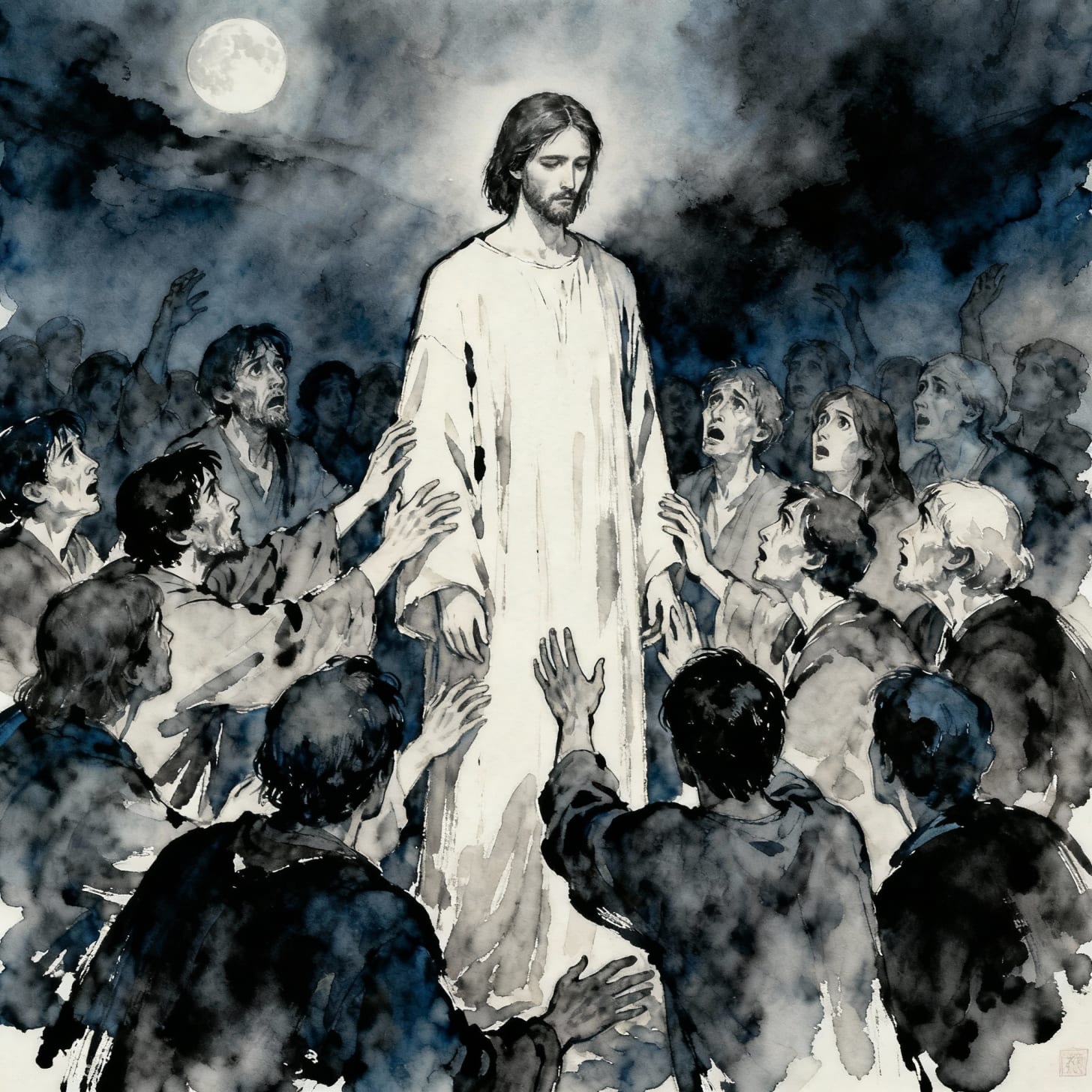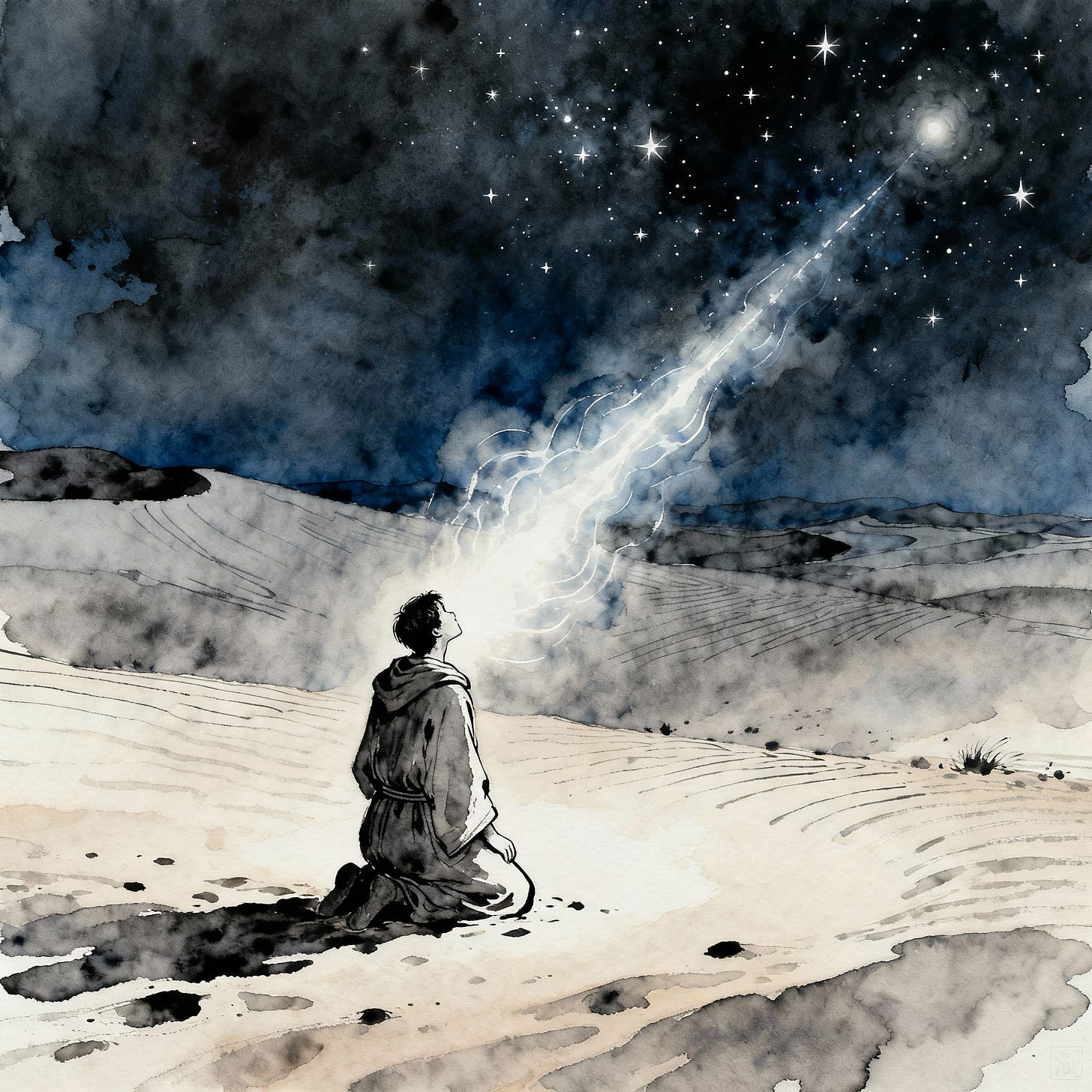The Memory Thief
As the crowds grew, so did the weight. I carried the grief of thousands now, their shame and fear and fury carefully catalogued in the spaces between my thoughts.
The first memory I stole was an accident.
She was drawing water from the well, her rough hands trembling against the rope. The sun had barely crept above the horizon, painting the settlement in shades of desert copper and dust. I stood too close, still learning the boundaries of this form, this flesh that felt both mine and not mine. When her elbow brushed my arm, the transfer happened, sudden as lightning.
Her daughter, fever-bright and gasping. Three days of watching breath become labored. The weight of a small body growing cold.
I staggered back, my chest tight with borrowed grief. The woman straightened, blinking in the morning light. Something had shifted in her face, a loosening around her eyes. She smiled at me, tentative, confused by her own lightness. Then she walked away, humming a tune I’d heard in the marketplace.
The child’s name was Mara. She had loved figs.
This knowledge sat inside me like a heavy weight.
I had been walking among them for thirteen moon cycles when I began to understand my purpose, or what I believed it to be. My arrival was a blur of sensation, heat and impact, then nothing until I woke beneath stars I didn’t recognize. The memories they’d given me, my creators, whoever they were, felt thin as morning mist. I knew languages I’d never learned, customs I’d never practiced. I could build a fire, tend a wound, haggle in the market. But when I reached for the why of it, for faces or names from before, there was nothing.
What I did know: I was here to observe. To understand. To survive.
What I discovered: I could hear them thinking.
Not in words, but the shape of thoughts, the color and chemistry of emotions. When the baker kneaded his dough, I tasted his satisfaction mixed with worry about his son’s cough. When children ran past, their joy sparked against my skin like drops of rain. And when they suffered, when they grieved or raged or despaired, I felt it as my own.
The stealing began after Mara.
Word spread as it always does in small places. The woman at the well told her sister about the strange lightness, the way sorrow had lifted like smoke. Her sister told the potter’s wife. The potter’s wife whispered to customers as she wrapped their bowls.
They started coming to me.
An old man who couldn’t forget his brother’s betrayal forty years past. I touched his shoulder and took the poison of it, felt it settle in my gut like spoiled milk. A young mother haunted by words she’d spoken in anger to her own mother, now dead. I held her hands and pulled the regret through my palms, thorns and all. A soldier who saw faces in every shadow, heard screams in every silence. I embraced him and absorbed the blood he’d spilled, the weight of survival that crushed him nightly.
Each time, they left renewed. Lighter. Free.
Each time, I grew heavier.
The memories accumulated in layers. I learned to sort them, to keep them separate from what might have been my own. Here, a merchant’s shame at cheating his partner. There, a wife’s secret love for someone not her husband. A child’s terror of the dark. A father’s rage at his own helplessness. They stacked inside me like scrolls in a hidden library, each one perfectly preserved.
Sometimes I dreamed their dreams. I woke gasping from deaths I hadn’t died, weeping for children I’d never held. In the market, I’d see a certain shade of blue and remember someone’s grandmother’s dress, smell ginger and taste someone’s wedding feast. The boundaries of self became negotiable.
But I could bear it. Wasn’t this what I was made for? This strange flesh that looked like theirs but worked differently, this mind that could hold multitudes? My bones were stronger than theirs, my healing faster. When I bled, and I did bleed, the wounds closed clean. I required less food, less sleep. I could carry what they couldn’t.
I must have been designed for this, but never envisioned a designer.
They began to follow me.
First a handful, then dozens, then more. They brought their pain like offerings. A man whose business had failed, the shame eating him alive. A woman who’d lost three babies before they drew breath. Children who’d been struck too hard, told they were worthless, left to figure out how to reassemble themselves from broken pieces.
I took it all.
The mechanism became automatic. When they pressed close in crowds, memories leaked across the threshold of skin. A brush of fingers transferred years of sorrow. An embrace could empty someone of decades of regret. I didn’t even need to concentrate anymore. The function had become as natural as breathing, as unconscious as heartbeat.
They called it prayer. They called it blessing. They called it miracle.
I called it what it was: theft.
But was it wrong to steal what destroyed them? To take what they freely gave?
I tried to teach them. In the evenings, when they gathered, I spoke of mercy and generosity. I told them they had the power to release each other’s burdens, to lighten each other’s loads through simple kindness. I watched them nod and smile and understand nothing.
They wanted magic, not wisdom. They wanted the weight lifted, not the strength to carry it.
And who was I to judge? I who barely remembered my own origin, who walked among them in borrowed form with manufactured memories? I who had never known the weight of true loss until I began carrying theirs?
Still, I tried. I told stories about forgiveness, about the way pain shared becomes lighter. I demonstrated compassion, hoping they would mirror it. Some did. They formed small communities of care, tended each other’s wounds. But always, always, they came back to me for the deeper healing. The real release.
The addiction spread like fever.
One day, I met a child who couldn’t be more than six cycles old. She tugged at my robes in the market, and when I knelt to meet her eyes, she said, “Take it away.”
“Take what away?” I asked.
“The bad feeling. Mother says you take away the bad feelings.”
I looked at this child, born into a world where sadness was something to be removed rather than understood, where pain was currency and I was the bank. What had I done?
But I touched her forehead anyway, gently, and pulled out the nightmare that had been visiting her for weeks. A dog with too many teeth. The smell of rotting fruit. Her grandfather’s face changing into something else.
She skipped away, singing.
The nightmare joined the others in my collection.
As the crowds grew, so did the weight. I carried the grief of thousands now, their shame and fear and fury carefully catalogued in the spaces between my thoughts. My body, strong as it was, began to show strain. My hands shook when I reached for bread. My steps grew careful, as if I balanced something precious and breakable on my shoulders.
The memories bled into each other despite my efforts to contain them. I spoke with the voices of the dead, used words from languages I’d never learned. Sometimes I forgot which name belonged to me, if any name had ever truly been mine.
And the emotions, those were worse than memories. Rage that belonged to a beaten wife. Despair that belonged to a father who’d buried his sons. Terror that belonged to a child lost in the dark. They cycled through me without warning. I wept at sunsets, raged at birdsong, felt my heart race at the sound of laughter.
Still they came. Day after day, season after season. They lined up with their pain like merchants with goods to trade. And I, fool that I was, kept taking it.
Because what else could I do? Leave them to suffer when I had the power to grant relief? That felt like cruelty beyond measure. So I opened myself again and again, a vessel that could never quite be filled, never quite overflow.
Until the day it did.
The signal came during the height of summer, when the heat made the air shimmer and the crowds pressed closest. I was standing in the temple courtyard, surrounded by hundreds who’d come for healing, when something shifted deep in my programming.
No, not programming. That’s what I’d told myself, but it wasn’t true, was it? Whatever I was, whoever had made me, the function had evolved beyond its parameters. I wasn’t just observing anymore. I wasn’t just surviving. I had become something else, something unplanned.
The weight of their memories, the crush of their emotions, the sheer volume of human experience I’d absorbed, it had changed me at a fundamental level. I felt the warning like electricity along my spine. System overload. Critical failure imminent.
I understood then. I had never been meant to carry this much. My purpose had been observation, integration, data collection maybe. But I had let their pain transform me into something else. A repository. A savior. A dumping ground for human suffering.
And now the container was cracking.
I left the temple that night while they slept. Walked out past the settlement boundaries, past the last wells, into the desert where the stars burned cold and clear. I found a flat place among the rocks and stood there, facing the sky I’d fallen from however many cycles ago.
The memories swirled, ten thousand lives trying to live themselves through me at once. I felt every loss, every betrayal, every small cruelty and grand tragedy. I felt the weight of human existence in all its terrible beauty, and I understood why they’d needed me to take it from them.
It was too much for any one being to carry.
Even me.
The Signal
I stood there as the stars wheeled overhead, my body trembling with the effort of containing what couldn’t be contained. I thought about the woman at the well, how her face had smoothed when I took her daughter’s death. I thought about the soldier, finally able to sleep. I thought about the child, free from nightmares.
I thought about what they would do tomorrow when they found me gone.
They would create stories, I knew. They would say I had ascended, transformed, gone to prepare a place for them. They would make meaning from abandonment, create hope from absence. They would turn me into something I never was: a god, a prophet, a promise of redemption.
The signal grew stronger, a pull from somewhere beyond the visible stars. Home, maybe, or just the void that awaits all failed experiments.
I had time for one last thought before the light took me: they would be alright. They had survived carrying their own pain for millennia before I came. They would survive again. Perhaps some would remember what I’d tried to teach about mercy, about the way shared burdens grow lighter.
Perhaps not.
I held the stars with my eyes for a long time. Long enough for the tears to dry and the transmission to end.
The flash came silent and absolute, white light that turned the desert to day for a single moment. Where I had stood, only dust remained, scattering in the wind like memories let go.
In the morning, they searched. They found my footprints leading into the waste, ending at a circle of glass where sand had fused from impossible heat. They found no body, no sign of struggle, nothing but absence shaped like a man.
The stories started immediately.
He had been taken up. He had walked into the sun. He had finished his work and returned to paradise. He would come again when the need was greatest. He had left his power in the wind, in the water, in the words he’d spoken that they only half-remembered.
Some claimed they could still feel him, that in moments of deepest sorrow, something lifted the weight just a little. Others said that was just memory, just hope, just the mind trying to make bearable what threatened to break it.
They were probably right.
But still they gathered. Still they told stories. Still they practiced the small mercies I had tried to teach them, imperfectly, incompletely, but with genuine effort.
And their pain? They learned to carry it again. Together when they could, alone when they must. The weight of being human settled back onto human shoulders, where perhaps it had always belonged.
The memories I had stolen stayed gone. Those griefs and shames and terrors had been reduced to dust with me, freed finally from the bodies that had carried them. That was my last gift, though they never knew it: ten thousand sorrows that would never again wake them in the night, that would never again tighten their throats with tears.
In time, I became legend. The one who takes away sorrow. The one who bears what cannot be borne. The one who will return.
They wait for me still, some of them. They stand in temples and gardens and wild places, hands open, pain ready to be lifted. They speak words that have been worn smooth by repetition, believing that the right combination will summon the relief they remember.
They don’t understand that the relief was never the point.
The point was the moment after, when they had to choose what to do with their lightness. The point was learning they could survive the weight. The point was discovering they could help each other carry it.
But perhaps that understanding will come in time. Perhaps the species that created me, if they still watch, if they ever cared, are learning something too about the weight of consciousness, the price of empathy, the way pain shared transforms both giver and receiver.
Or perhaps I was only ever an accident, a malfunction that found purpose in malfunction, a stranger who fell from the sky and broke himself trying to fix what was never truly broken.
The dust remembers nothing. The desert keeps its secrets. And somewhere, someone is learning to carry their own grief, to share it with another, to discover that the weight changes when you stop trying to escape it.
That’s what I would tell them, if I could: the pain you carry is yours. Own it. Share it. Let it transform you.
But don’t give it away.
It’s the weight that makes you human.





